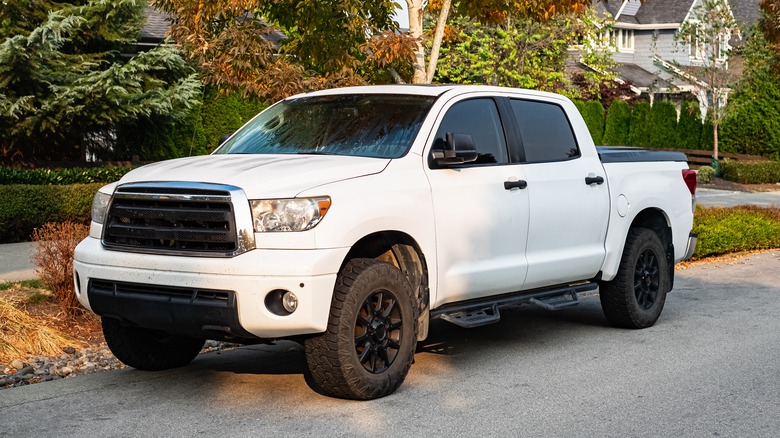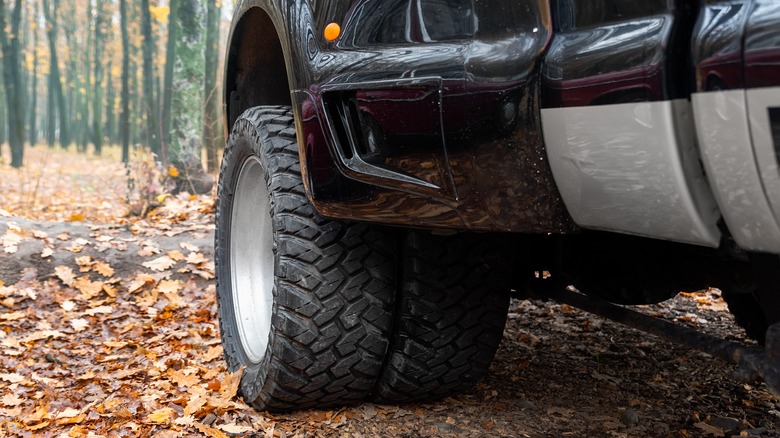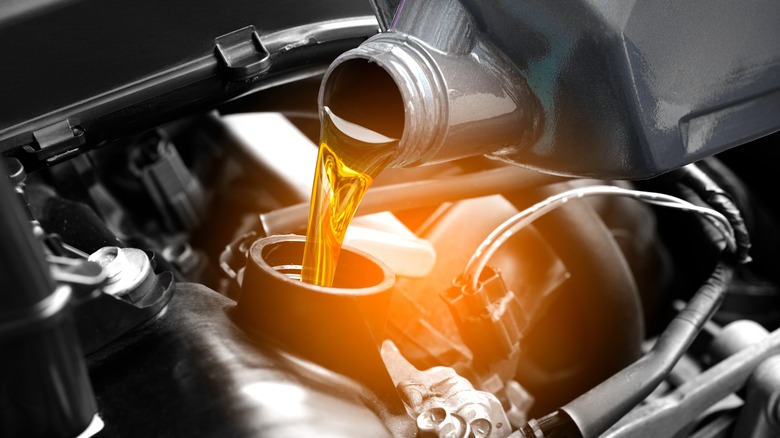5 Must-Know Truck Maintenance Tips For Every Season
From icy roads in the winter to scorching heat that makes you wonder if your AC will give out in the summer, your truck has to deal with a variety of weather conditions throughout the year. While most of us have been taught that the amount of miles on our odometer is the best indication of when maintenance is needed, it's not the only factor that comes into play when keeping your truck in the best condition possible — seasonal upkeep is also a must, especially if you live in a region that experiences extreme changes in weather from one season to the next.
Keeping up with seasonal maintenance can help prevent breakdowns, extend the life of your truck, and keep it running smoothly and safely throughout the year. You most certainly won't have to overhaul your truck completely at the beginning of each season. Instead, it's a good idea to focus on tasks that are appropriate for the current climate, like changing fluids, inspecting the tires and brakes, and ensuring your heating and cooling systems are working correctly.
Spring: Get ready for rain
Winter weather can do a number on even the hardiest truck, so as spring approaches, many of us look forward to leaving behind the ice, snow, and cold that define the coldest season in many parts of the country. You may even think milder temperatures mean you turn your attention to things other than maintaining your truck. While that may be true to a certain extent, spring may bring its own set of issues for your vehicle, depending on where you live. Spring marks the beginning of the rainy season in many parts of the U.S., making it a good time to prepare your truck for the rainy weather that is so common at this time of the year. One of the easiest but often overlooked tasks during this time is inspecting and replacing windshield wiper blades.
Even if your blades seem in good condition, it's important to remember that the ice and snow from the winter months may have damaged them, making spring a good time to consider getting replacements. We've all experienced windshield wipers that aren't working properly. It can get so bad that they seem to be doing more harm than good as you try navigating the streets with minimum visibility in a downpour. Consider replacing your truck's windshield wipers if the blades are cracked or peeling, making scratching noises, leaving streaks, not making contact with the windshield, or skipping. Installing fresh blades can help you avoid these problems and stay safe on the roads.
Summer: Beat the heat
As the temperatures rise in the summer, they can strain your truck's cooling system, leading to overheating. That's why your truck's radiator and cooling systems should be at the top of your maintenance to-do lists during the summer months. In the best-case scenario, overheating will reduce your vehicle's efficiency; in the worst-case scenario, you could end up with significant engine damage. You've probably even seen people pulled to the side of the road with a smoking engine from overheating. If you want to keep this unfortunate situation from happening to you, regularly checking and maintaining your truck's cooling system in hot weather is a must.
At the beginning of the season, check your coolant levels and repeat this throughout the summer. If you've gone 30,000 or more miles without receiving a coolant flush, now is the time to get one. You'll also want to check your car's radiator to ensure it's in good condition. If you notice your vehicle's temperature gauge inching up, that's a sign your truck's cooling system may be failing. If this happens, you can do a few things to minimize damage from your truck's engine overheating. Still, it's best to perform preventative checks at the beginning of the summer to lessen the chances of this issue coming up in the first place.
Fall: Get ready for cooler weather
Fall brings many changes — cooler temperatures and falling leaves, to name a few. This time of year is a good time to prepare your car for the colder weather that's right around the corner, with battery checks and maintenance being key to ensuring your truck starts reliably in the cold. Cold weather takes its toll on battery power, which can make it harder to start the engine or in extreme temperatures, making it impossible to get enough power to the engine to start it at all.
Testing your battery's strength as part of your truck's fall maintenance can help you identify any issues and fix any problems before the cold sets in. It's important to do this in the fall because the summer's heat may have already weakened your truck's battery, and increased moisture in the fall can cause it to deteriorate further.
Beyond testing your battery, you should keep an eye out for the following things that could signal your battery is past its prime:
- Check engine light is on.
- It takes longer for the engine to start.
- The lights are dimmer than usual.
- In-car electrical features like the radio, power windows, phone charger, etc, are malfunctioning.
Winter: Combat the cold
Winter weather brings another set of challenges for your truck, and for that reason, tire inspection and pressure adjustment should be at the top of your list of things to check when preparing your vehicle for the colder months. Tire pressure decreases significantly in cold temperatures, losing around 1 PSI (pound per square inch) for every 10 degrees Fahrenheit drop in temperature. This low pressure can negatively impact traction, making it difficult for your truck's tires to grip the road and increasing the time it takes to brake. As if that weren't enough, it could also reduce fuel economy and shorten the life of your tires.
Given the safety implications, it's easy to see why checking your tire pressure in the winter isn't a one-time thing. To ensure your safety on the road and optimize your vehicle's performance, you'll need to regularly monitor (a good rule of thumb is every other time you fill up your car) and adjust your tire pressure throughout the colder months.
Year-round maintenance
Once you've got your truck's seasonal maintenance down, you'll want to ensure you're keeping up with regular maintenance inspections and servicing to keep it in tip-top shape all year long, and periodic fluid checks are one of the best ways to do this. Fluids are often referred to as the lifeblood of a vehicle because they play a critical role in the lubrication, cooling, and overall operation of the engine and other components. Regularly checking and changing your truck's fluids can prevent breakdowns, extend the lifespan of your vehicle, and ensure it runs smoothly and efficiently.
For example, regularly changing your engine oil ensures proper lubrication and prevents wear and tear on your engine. Similarly, replacing your brake fluid on schedule keeps your brakes working properly, while transmission fluid ensures you can shift gears smoothly, and coolant prevents overheating by maintaining the engine at the right temperature. Keeping up with fluid checks can help you catch potential issues early, avoid expensive repairs, and ensure your truck's optimal performance.





